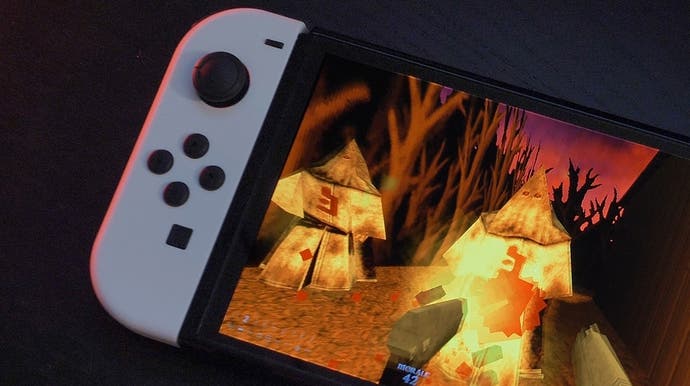Dusk on Switch: a beautifully nightmarish modern retro shooter
The PC game is brilliant - and the mobile port is exceptional.
Dusk is a dark, pixelated, nightmarish boomer shooter - and it left a strong impact when it first shipped on PC back in 2018. In fact, it's one of my top ten games of that year, and it's still brilliant even today. On the surface, the game looks like it stepped right out of 1997, doing a remarkable job of capturing the Quake aesthetic, but beneath the hood, you may be surprised to learn that this is actually a Unity engine project. That's no problem for a modern PC, but what about Nintendo Switch? Dusk is coming soon to the console hybrid and I'm happy to report that the Switch conversion is excellent.
Now, in theory that shouldn't be too difficult, right? After all, Dusk is a retro-stylised shooter, built to approximate the look and feel of a mid-90s, software-rasterised polygonal first-person action game. Dusk does a commendable job of mimicking this very specific Quake-like look. Its hand-painted textures, designed to seamlessly tile across large planes, lack any sort of bilinear interpolation. These textures proudly flaunt raw, pixelated texels, boldly eschewing mip-maps as they're slathered across every map. The maps and the denizens populating them are made up of precious few polygons lending the game an abstract appearance - the silhouette of its jagged architecture and low colour assets strengthen the nightmarish aesthetic Dusk so beautifully delivers.
Getting that authentic feel isn't easy, but Dusk succeeds where many others fail and the work done in delivering this experience to Switch owners is suitably impressive - in fact, I think it's up there with the more expert Unity titles available on Switch. This wasn't easy. According to the developer, Switch barely cracked 20 frames per second when initially ported, but barring a few drops to performance in the busiest areas, the final game is essentially locked to 60fps in both docked and mobile modes, which run at native 1080p and 720p respectively. It features no anti-aliasing (the correct choice for this aesthetic!) and offers additional visual customisation including different colour modes - which can be fine tuned by hand, if you desire.
Compared to the PC version running at 1080p, it looks nearly identical. There are the same textures and the same meshes. However, reaching 60fps did require a good degree of optimisation. In terms of what's actually visible to the player, there are a couple of key changes made in pursuit of faster performance. Firstly, particle density is scaled back somewhat, while the number of dynamic lights have been reduced. You still get muzzle flash lighting, the flashlight and some dynamic lights during combat but lighting from particles is absent on Switch. Under the hood, however, there were more profound changes made - firstly, the project was overhauled to a newer version of Unity. According to the developer, they're using 2020.2.0f1, specifically. Secondly, the developer went through every single map with a fine-toothed comb in order to best optimise for Switch. It relies more heavily on smart occlusion culling to avoid wasting resources on unnecessary geometry while many meshes were optimised and merged to further improve performance.
In combat, shader-based resizing is used to prevent overdraw related slowdown from alpha effects, such as explosions. The codebase was also reworked with AI, physics, lighting, scripting and a shift to Unity's jobs system standing as some of the necessary changes. Basically, a lot of very manual work was carried out to ensure each map in the game ran as smoothly as possible while retaining the original look and feel - and the overall impression I get is of an exceptionally well-made port of the best boomer shooters of the last few years. It's a conversion worth highlighting because the care and attention to detail is up there with Switch's best - this is indeed a nigh-on flawless iteration of an excellent game.


